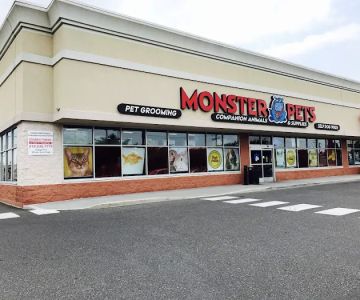How to Help Pets with Digestive Problems: A Comprehensive Guide
- Understanding Pet Digestive Issues
- Common Symptoms of Digestive Problems in Pets
- Treatments for Digestive Problems in Pets
- How to Prevent Digestive Issues in Pets
- When to Consult a Veterinarian
- Real-Life Case Studies: How Digestive Issues Were Managed
1. Understanding Pet Digestive Issues
As pet owners, one of the most concerning issues we can face is when our beloved animals experience digestive problems. Just like humans, pets can suffer from a range of digestive disorders that affect their overall health and wellbeing. Digestive issues in pets can range from mild discomfort to severe health complications, and understanding these problems is the first step in finding a solution.
Pets have delicate digestive systems, and there are many factors that can disrupt their normal digestive function. The causes of digestive problems in pets are varied and can include diet, stress, infections, and even genetics. As pet owners, it’s important to be vigilant and learn how to recognize the signs of digestive distress so that you can help your pet recover quickly and comfortably.
By consulting a veterinarian, you can ensure that your pet receives the right treatment, which may involve dietary adjustments, medication, or lifestyle changes. In this article, we’ll explore common digestive problems in pets, their symptoms, and ways to help manage and prevent these issues to keep your furry friend happy and healthy.
2. Common Symptoms of Digestive Problems in Pets
Knowing the symptoms of digestive problems in pets can help you act quickly when you notice any signs of distress. Symptoms can vary depending on the specific issue, but some common signs include:
- Vomiting: Vomiting is a common sign of digestive issues, and it can be caused by a variety of factors such as infections, toxins, or dietary changes. If your pet is vomiting repeatedly, it could indicate an underlying digestive problem that needs attention.
- Diarrhea: Diarrhea is another common symptom that can be caused by stress, diet, or infection. It’s important to monitor your pet’s stool and take note of any changes in frequency or consistency.
- Lack of Appetite: If your pet suddenly stops eating or shows less interest in food, it could be a sign that something is wrong with their digestive system. Loss of appetite can result from nausea, pain, or discomfort in the stomach or intestines.
- Excessive Drooling: Drooling can be a sign of nausea or gastrointestinal distress. If your pet is drooling excessively, it may be a result of indigestion or an upset stomach.
- Constipation: Difficulty passing stools or irregular bowel movements can indicate digestive issues such as constipation, which can be caused by dehydration, low-fiber diets, or other gastrointestinal problems.
If you notice any of these symptoms in your pet, it’s important to monitor them closely and consult a veterinarian if the symptoms persist or worsen. In some cases, digestive issues may resolve on their own, but in others, they may require medical intervention.

1946 S Christopher Columbus Blvd, Philadelphia, PA 19148, USA
See Details3. Treatments for Digestive Problems in Pets
Once your pet has been diagnosed with a digestive issue, the treatment options will depend on the underlying cause. Below are some common treatments that veterinarians may recommend for pets with digestive problems:
- Dietary Changes: One of the first things a veterinarian may recommend is adjusting your pet’s diet. This could involve switching to a more easily digestible food, reducing portion sizes, or feeding smaller, more frequent meals. Some pets may benefit from a special prescription diet to help soothe their digestive system.
- Medications: In some cases, pets may require medications to treat their digestive problems. These can include anti-nausea drugs, probiotics to restore gut health, or antibiotics if an infection is present. It’s important to follow your veterinarian’s instructions carefully when administering medications.
- Hydration: If your pet is dehydrated due to vomiting or diarrhea, ensuring they stay hydrated is essential. Your veterinarian may recommend oral rehydration solutions or, in more severe cases, intravenous fluids to replenish lost fluids.
- Stress Management: Stress is a common trigger for digestive problems in pets. If your pet is experiencing stress, your veterinarian may suggest stress-relieving methods such as calming supplements, pheromone diffusers, or changes to their environment.
- Surgery: In rare cases, surgery may be required if your pet has a more serious digestive condition such as an obstruction or a gastrointestinal disease that requires surgical intervention.
It’s essential to work closely with your veterinarian to determine the best course of action for your pet. Timely and effective treatment can help alleviate discomfort and prevent more serious health issues down the road.
4. How to Prevent Digestive Issues in Pets
Preventing digestive problems is always better than dealing with them after the fact. Here are some preventative measures you can take to help keep your pet’s digestive system in tip-top shape:
- Feed a Balanced Diet: The foundation of good digestive health is a high-quality, well-balanced diet. Ensure that your pet’s food contains the right mix of nutrients and fiber to promote healthy digestion. Avoid feeding your pet table scraps or human food, as these can upset their stomach.
- Provide Fresh Water: Always make sure your pet has access to fresh, clean water. Dehydration can lead to constipation and other digestive issues, so it’s important to encourage regular water intake.
- Regular Exercise: Physical activity is essential for good digestion. Make sure your pet gets regular exercise to keep their digestive system moving and healthy. Exercise can also help reduce stress, which is often a trigger for digestive problems.
- Avoid Stressful Situations: Stress can have a negative impact on your pet’s digestive system. Try to minimize stressors in their environment, such as loud noises, unfamiliar animals, or sudden changes in routine.
- Routine Vet Check-Ups: Regular visits to the vet can help catch any potential digestive problems early. Annual or semi-annual check-ups will ensure that your pet is healthy and prevent any underlying issues from developing.
5. When to Consult a Veterinarian
If your pet is experiencing persistent digestive issues, it’s essential to consult a veterinarian as soon as possible. While minor digestive problems may resolve on their own, more serious conditions require medical attention. Signs that it’s time to see a vet include:
- Frequent vomiting or diarrhea that lasts more than 24 hours
- Signs of dehydration, such as dry gums, lethargy, or sunken eyes
- Severe abdominal pain, bloating, or swelling
- Loss of appetite lasting more than a couple of days
- Unexplained weight loss or changes in stool
Prompt veterinary care can prevent further complications and ensure that your pet’s digestive health is properly managed.
6. Real-Life Case Studies: How Digestive Issues Were Managed
Let’s take a look at some real-life examples of pets who were successfully treated for digestive issues. A friend of mine had a dog named Max, who had been suffering from persistent vomiting and diarrhea. After trying a few over-the-counter remedies, the symptoms worsened, and they sought professional help. The vet diagnosed Max with a food allergy and recommended a special diet that eliminated the problematic ingredient. Within weeks, Max was back to his energetic self, and his digestive issues were resolved.
Another case involved a cat named Whiskers, who had been experiencing constipation and had trouble using the litter box. After a thorough examination, the vet recommended more fiber in Whiskers’ diet and prescribed a mild laxative. After following the vet’s instructions, Whiskers’ constipation was resolved, and his digestive system returned to normal.
These cases highlight the importance of seeking timely veterinary care. By working with a professional, you can help your pet recover from digestive issues and maintain a healthy digestive system for years to come.
If your pet is experiencing digestive problems, don’t hesitate to contact a veterinarian. At Hidden Brook Veterinary, we offer expert care to help your pets feel their best. Visit our website for more information and to schedule an appointment.










